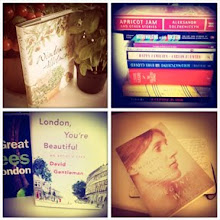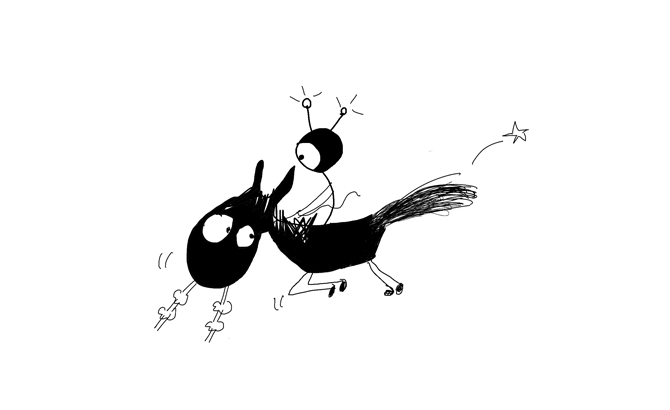Last night I dreamt of monkeys. In my dream a frail old lady sat in a wicker chair looking at trees dancing in the moonlight. With her soft silvery hair and kohl lined eyes. A black and white silhouette. A gentle witch. A blithe spirit. A figment of fantasy. She smiled as she came out of her reverie. And the monkeys trooping across the fort wall, marching in straight file ably commanded by the leader, for a moment froze in the silver light.
There you are, as always, there you are, she murmured. I can see each one of you. The ones before you, the ones after you and the ones that are yet to come. I know everyone of you and everything about you. Your every mood, your every emotion, your every virtue, your every indulgence. I was there when it all began. And I will be there till you are there. She chuckled and lifted her hand to smoothen her hair and the monkeys all at once disappeared, as if struck by a blow.
I need to write a book. My life has been a fascinating journey. The fact that I have survived is deemed a miracle by the most qualified of professionals, as well as, the closest of friends. Like any other life mine too has had its own curious twists and turns. But I feel my life most closely mirrors yours. As an infant I have had my days in the sun. Basking in the shadow of love and protection. As an adolescent I too have strayed from the known path. My curiosity getting the better of me. As a maturing adult I too have learnt where life hides the choicest of fruits and the sharpest of barbs.
Like you I am nimble and light footed. Easily side-stepping danger and awkwardness. Or at least so I believe. I have wandered through innumerable labyrinths and still found the goal. I have been feted and stoned. I have been hugged and chained. I have been revered and mercilessly hounded. The parallels overlap. And the narratives merge. In another life I may have been you.
I need to write a book. But how do we measure a lifetime? How do we describe it all? There are lines upon lines and words upon words and still the plot is not clear. Only you and I understand that which the lines hide and the words obscure. There are no invisible ropes that bind or elusive clasps that hold. There is only a heart wide open and a mind full of acceptance. Tempered by a touch of empathy and the whiff of an ancient memory. How will words do justice? What prose will encompass that which we convey with a mere glance? How many words, days, months, lifetimes will it take to explain it all?
The monkey troop gathered in the failing light. As one they turned and looked towards the fort wall. The old lady, the monkey troop and the tide of time. The circle was completed and so again it began.
Last night I dreamt of monkeys and a frail old lady. The monkey mother. Reminiscing about a lifetime. An epoch. The soft sea breeze ruffled the tall palm trees. And another moment faded into my memory.
(for Ms. Iqbal Malik)
Monday 29 September 2008
Monday 15 September 2008
Beggars of London
Can an Indian write about poverty in London? And I don't mean poverty in Victorian London as depicted by Charles Dickens or encountered during one of her many walks through its streets some 100 years later by Virginia Woolf. But poverty in 21st century London. Poverty that exists here and now.
The same poverty that escapes people as they catch the first flight out of London to India, Cambodia, Africa, and hosts of other such places. Places where they can enjoy a comfortable lifestyle while sprouting moralistic rants against the not-poor-but-trying-to-get-by-educated class or the ones who not unlike them have managed to make money, yes, created wealth, the worst offense that a man can commit, especially when surrounded by the poor, the dispossessed and the destitute.
These seekers of adventure in the course of 6 months, a year or maybe two years collect enough indignation for the wealthy and adoration for the beggars to write a decent sized book and bag a more than decent sized book deal back home. A personal memoir about how they fucked up their life in London and then a trip to India (or any other equally unfathomable destination) made them realize the triviality of their problems and the melancholic beauty of poverty. Their adventure complete, they promptly return to the home country. Sometimes never to go back again.
But they'll often tell anyone who cares to listen that the trip to India has made them a better person. For now they can appreciate poverty's inherent magnetism. Its heart of goodness. By merely being in its presence they became human and more humane. And they'll never fail to scorn at the rich classes or scoff at the sexual repression of the middle ones. Those hypocrites. Their films have no sex scenes! And also stick to the irritating habit of amalgamating and interchanging the rich and middle classes together. Especially so in context of India. Or using their experience of life in Bandra (Bombay) or Greater Kailash (Delhi) and in some extreme cases Dharmshala as a generalization for how all Indians think and feel. And always end by mentioning the irresistible charm of poverty.
Then maybe I'll say what about poverty in London? And their eyes will glaze over, as they'll mention the beggars under the underpass and outside the train stations. A minute will pass before I realize that they are re-visiting the splendor of India and not referring to the handicapped homeless man sleeping under the underpass close to Tate Modern with a board saying "I am a homeless handicap. I don't do drugs or drink alcohol. Don't beat me." Or the beggar outside Bethnal Green Station too miserable and cold to even lift his head and look up as you drop a coin in his Styrofoam cup. Or the old lady in Charring Cross dragging her tattered belongings in a broken shopping cart. And so the moment will pass.
But the thought remains. What makes people 'appreciate' poverty? Who are all these people who fly around the world seeking to dwell in the many splendors of poverty while ignoring it as they rush to catch the tube back home? And what is this poverty they find alluring? Does poverty always have to give something back to make it 'captivating' enough-make you a better person, help you appreciate your life more or make your problems seem trivial?
So, children of doctors from South Africa, stockbrokers from America, and bankers from London will keep seeking the adventure of their life in India. The incredible poverty will reassure them and re-invigorate them. But the struggles of those who manage to stay afloat. Those who unlike them can't run to London or Cape Town to seek beauty but instead look for it in their religion and their films. Those who had they been similarly blessed with the comfort of being just a flight away from escape would too find the time to dwell on the beauty of poverty. Indeed even write realms about it. These will only get derision and disrespect. These will always fail to stand up to the stringent moral assessments. These will always be shown the harsh poverty surrounding them that they dared to get away from, no, far worse ignore.
So, these children of the West will endlessly travel eastward searching for the dispossessed. Embracing the impoverished. All in an effort to drive away Ibsenian ghosts nibbling away at their souls. Exalting their ideas and ideals of poverty. All the while denying the rest of us a chance to move away from it. To not dwell upon it all our waking life even though we maybe separated from it by a few paces or in many cases just a generation. Also denying us the choice to sometimes ponder upon the ordinary. How can you talk about normal problems of life when your country has so many beggars? Why don't you feel anger and rage? How can you not see the "real" life around you everywhere?
Thus 'developed' by their jaunt through poverty in the by lanes and alleys of India these honorable and naïve citizens of the world will hold forth on morality in every global platform. Telling those who don't fall under the ever-shifting lines of poverty what ideals to aspire towards, what issues to rage against, what answers to search for in their art, what reality to depict in their films, what kind of music to compose, how to react when faced with a beggar sleeping under some underpass, how to talk about poverty. In short how to become more human. Better human.
And they'll turn vicious when faced with an idea germinating in these same places with abject poverty, which runs counter to all they hold moral and dear. Maybe even questions their idea of what is ethical and honest. Or even poverty itself. For don't they often miss the other more potent one festering among their midst? This poverty of empathy, this poverty of vision, this poverty of ideas. This incredible poverty of the ability to look at life as it exists everywhere. But who will tell these beggars of London to not go searching for it in places foreign but appreciate it in ideas foreign, even those often opposed to their deeply set prejudices. To acknowledge that 6 billions souls can't chase the same ghosts or cherish the same ideas with equal fervor. That would indeed make them more humane. So, can an Indian write about this poverty in London?
The same poverty that escapes people as they catch the first flight out of London to India, Cambodia, Africa, and hosts of other such places. Places where they can enjoy a comfortable lifestyle while sprouting moralistic rants against the not-poor-but-trying-to-get-by-
These seekers of adventure in the course of 6 months, a year or maybe two years collect enough indignation for the wealthy and adoration for the beggars to write a decent sized book and bag a more than decent sized book deal back home. A personal memoir about how they fucked up their life in London and then a trip to India (or any other equally unfathomable destination) made them realize the triviality of their problems and the melancholic beauty of poverty. Their adventure complete, they promptly return to the home country. Sometimes never to go back again.
But they'll often tell anyone who cares to listen that the trip to India has made them a better person. For now they can appreciate poverty's inherent magnetism. Its heart of goodness. By merely being in its presence they became human and more humane. And they'll never fail to scorn at the rich classes or scoff at the sexual repression of the middle ones. Those hypocrites. Their films have no sex scenes! And also stick to the irritating habit of amalgamating and interchanging the rich and middle classes together. Especially so in context of India. Or using their experience of life in Bandra (Bombay) or Greater Kailash (Delhi) and in some extreme cases Dharmshala as a generalization for how all Indians think and feel. And always end by mentioning the irresistible charm of poverty.
Then maybe I'll say what about poverty in London? And their eyes will glaze over, as they'll mention the beggars under the underpass and outside the train stations. A minute will pass before I realize that they are re-visiting the splendor of India and not referring to the handicapped homeless man sleeping under the underpass close to Tate Modern with a board saying "I am a homeless handicap. I don't do drugs or drink alcohol. Don't beat me." Or the beggar outside Bethnal Green Station too miserable and cold to even lift his head and look up as you drop a coin in his Styrofoam cup. Or the old lady in Charring Cross dragging her tattered belongings in a broken shopping cart. And so the moment will pass.
But the thought remains. What makes people 'appreciate' poverty? Who are all these people who fly around the world seeking to dwell in the many splendors of poverty while ignoring it as they rush to catch the tube back home? And what is this poverty they find alluring? Does poverty always have to give something back to make it 'captivating' enough-make you a better person, help you appreciate your life more or make your problems seem trivial?
So, children of doctors from South Africa, stockbrokers from America, and bankers from London will keep seeking the adventure of their life in India. The incredible poverty will reassure them and re-invigorate them. But the struggles of those who manage to stay afloat. Those who unlike them can't run to London or Cape Town to seek beauty but instead look for it in their religion and their films. Those who had they been similarly blessed with the comfort of being just a flight away from escape would too find the time to dwell on the beauty of poverty. Indeed even write realms about it. These will only get derision and disrespect. These will always fail to stand up to the stringent moral assessments. These will always be shown the harsh poverty surrounding them that they dared to get away from, no, far worse ignore.
So, these children of the West will endlessly travel eastward searching for the dispossessed. Embracing the impoverished. All in an effort to drive away Ibsenian ghosts nibbling away at their souls. Exalting their ideas and ideals of poverty. All the while denying the rest of us a chance to move away from it. To not dwell upon it all our waking life even though we maybe separated from it by a few paces or in many cases just a generation. Also denying us the choice to sometimes ponder upon the ordinary. How can you talk about normal problems of life when your country has so many beggars? Why don't you feel anger and rage? How can you not see the "real" life around you everywhere?
Thus 'developed' by their jaunt through poverty in the by lanes and alleys of India these honorable and naïve citizens of the world will hold forth on morality in every global platform. Telling those who don't fall under the ever-shifting lines of poverty what ideals to aspire towards, what issues to rage against, what answers to search for in their art, what reality to depict in their films, what kind of music to compose, how to react when faced with a beggar sleeping under some underpass, how to talk about poverty. In short how to become more human. Better human.
And they'll turn vicious when faced with an idea germinating in these same places with abject poverty, which runs counter to all they hold moral and dear. Maybe even questions their idea of what is ethical and honest. Or even poverty itself. For don't they often miss the other more potent one festering among their midst? This poverty of empathy, this poverty of vision, this poverty of ideas. This incredible poverty of the ability to look at life as it exists everywhere. But who will tell these beggars of London to not go searching for it in places foreign but appreciate it in ideas foreign, even those often opposed to their deeply set prejudices. To acknowledge that 6 billions souls can't chase the same ghosts or cherish the same ideas with equal fervor. That would indeed make them more humane. So, can an Indian write about this poverty in London?
Wednesday 10 September 2008
Sewa Nagar Revisited
I remember Sewa Nagar. The roadside stalls selling fruits, cheap plastic combs, sunglasses and the usual stuff you never think about because in India it’s always available somewhere close to you. It may catch your sight as you zip by in your car. And then you’d ask your driver to run and buy 2 kilos of those delicious looking mangoes or say “aarey litchi bazaar mein aa gaye. I didn’t even realize. How time passes?” Or you maybe sitting all bundled up in the bus, trying to protect yourself as best as you can from the man sitting next to you lest any part of his body touches yours, when your eyes fall on a pheriwallah and his cart brimming with belts, handkerchiefs, socks and combs. And you’d suddenly realize “Oh shit! I need to buy a new belt.”
I remember Sewa Nagar for what it was. A street with vendors occupying a small space on the pavement and offering a whole world of goods and services to a city with no time to think. So that people needn’t make a special effort to get something as simple as a comb. Where at lunch hour guys from the local ad agency and the rickshaw pullers could rush for its 8 rupees lunch of hot and cooked-right-before-your-eyes baingan bharta and chapatti. Or the 5 rupees choola kulcha with lots of lime and green chilies. Or to just stop by to get the shoe mended before a meeting. Or a punctured tyre repaired. Or simply for a pudiya of peanuts to pass the time while waiting for the bus or the light to turn green.
I remember Sewa Nagar for what it is. A pheri bazaar in any city of India. A means of sustenance for those who exercise their right to a livelihood with dignity. A place where the carwallah and the cyclewallah are equally welcome. A place that reminds you of the passage of seasons even though the daily drudgery of life may seem monochrome. Diwali Diyas, Summer Mangoes, Monsoon cheap umbrella. A place where you can assess the clout of Gods and film stars by analyzing whose poster is given place of prominence. A kaleidoscope of popular culture. A place where the marginalized millions can measure how they get shortchanged daily when their earning of 30 rupees diminishes rapidly in value.
Then suddenly one day I see Sewa Nagar for what it has become. Not a small nondescript street market but an arena for the play of larger than life egos. A hopelessly one-sided confrontation between the pheriwallahs and the police, the courts, the politicians, the drivers of big cars. A question of who decides who has the right to a livelihood and who doesn’t. Or the right to reside in a city. A measure of the great tectonic shift in how a city chooses to define itself. A symbol of our dying empathy. A wistful shake of our heads at all the madness and colour and culture we wish to let go of and for what. A Haldighati for reclaiming the soul of a nation.
I remember Sewa Nagar for what it was. A street with vendors occupying a small space on the pavement and offering a whole world of goods and services to a city with no time to think. So that people needn’t make a special effort to get something as simple as a comb. Where at lunch hour guys from the local ad agency and the rickshaw pullers could rush for its 8 rupees lunch of hot and cooked-right-before-your-eyes baingan bharta and chapatti. Or the 5 rupees choola kulcha with lots of lime and green chilies. Or to just stop by to get the shoe mended before a meeting. Or a punctured tyre repaired. Or simply for a pudiya of peanuts to pass the time while waiting for the bus or the light to turn green.
I remember Sewa Nagar for what it is. A pheri bazaar in any city of India. A means of sustenance for those who exercise their right to a livelihood with dignity. A place where the carwallah and the cyclewallah are equally welcome. A place that reminds you of the passage of seasons even though the daily drudgery of life may seem monochrome. Diwali Diyas, Summer Mangoes, Monsoon cheap umbrella. A place where you can assess the clout of Gods and film stars by analyzing whose poster is given place of prominence. A kaleidoscope of popular culture. A place where the marginalized millions can measure how they get shortchanged daily when their earning of 30 rupees diminishes rapidly in value.
Then suddenly one day I see Sewa Nagar for what it has become. Not a small nondescript street market but an arena for the play of larger than life egos. A hopelessly one-sided confrontation between the pheriwallahs and the police, the courts, the politicians, the drivers of big cars. A question of who decides who has the right to a livelihood and who doesn’t. Or the right to reside in a city. A measure of the great tectonic shift in how a city chooses to define itself. A symbol of our dying empathy. A wistful shake of our heads at all the madness and colour and culture we wish to let go of and for what. A Haldighati for reclaiming the soul of a nation.
A rant
It's obvious from a recent article in The Guardian that Nirpal Dhaliwal doesn't like Hindi films. And he hates Rock On. Good for him. But then why do we have to suffer his asinine Hindi film reviews, week after week? Every week Guardian's website has some weird headline regarding the latest Hindi film which is followed by an even weirder analysis of the film. Often comparing it unfavourably to some stupid Hollywood film.
That is Nirpal Dhaliwal. Guardian's man in Mumbai, Delhi and India. Sent to mock Hindi films, and Indians, and report on all that is wrong with them, or so it seems.
But first Mr. Dhaliwal establishes his credentials as a virtuous citizen of this world and thereby usurps the right to mock Indian hypocrisy via films. In fact we stand no chance in front of his moral upbraiding. He is so full of self-righteous concern about India's problem that he chooses to vent all his anger on films. And then too, instead of trying to understand why Hindi films move masses across class, caste and linguistic borders he earns his remittance by supplying lazy articles mocking them. And can they be more generic? Or more pandering to western tastes?
He is most of the time preoccupied in comparing Hindi films with Hollywood ones- no sex, so little gross stuff like puke or people getting smash drunk, everyone is a polite, mollycoddled uber nerd. He loves the word mollycoddled. It is his biggest grouse against us. We are mollycoddled urban Indians who like to watch tame films about mollycoddled uber nerds living with their mums. God forbid if a film about molycoddled beings becomes a hit. For then he becomes especially vicious. It's almost as if he wishes he was mollycoddled. Some kind of Freudian obsession maybe.
His latest moralistic rant against Rock On is so full of western clichés that the only granny rocking here is Mr. Dhaliwal and his outdated "westernized" perspective. The reality he feels most Indians ignore is actually our life. We live it everyday. Even after Mr. Dhaliwal puts away his pen after the mandatory tribute to the beggar under the underpass to enjoy Delhi's nightlife or to listen to Joy Division to articulate his frustration. We'll be living it even when he packs his bags at the end of his Indian summer.
His jaded analysis trying to relate the film to MTV-addicted-middle-class-urban youth is so juvenile that it can only be countered with laughter. He is so cavalier that he doesn't even pause to clarify what he means by middle class urban youth. Surely now that he is living in India he doesn't think that the Indian middle class is a monolithic, monochromatic whole. Further on he continues his argument by dividing India into two clearly demarcated rich and poor classes. Yes, the rich are mollycoddled, bourgeois hipsters living with their mums in short bad people and the poor, helpless, dispossessed who don't channel their rage to form Punk and Rock bands like in the West, are the good people. Maybe he secretly wants to write a Hindi film script. And after annihilating weak trash like Rock On that hides the ugliness of India he concludes by lamenting how Indians don't articulate 'the anger, melancholy and haunting beauty of what I see around me everyday" by following in the footsteps of British bands. Does he even know what he is talking about?
The point Mr Dhaliwal doesn't seem to get is that Indians have a distinct culture and taste and style. The day MTV started playing Hindi film music and McDonald's started serving McAloo Tikki burger India once again redefined modernity. And it was distinctly Indian. And we like our films that way too. Distinctly Indian.
The question for Mr. Dhaliwal is can Indians lay claim to a modernity that is far removed from what the West considers it to be? Can Mr. Dhaliwal and Guardian ever acknowledge it? And do Indians care for their acknowledgment?
So, why is Guardian giving such mediocre write-ups such prime space on its website? And why does it need to have some guy mock Hindi films and Indians when clearly his views are almost meaningless. Surely, Guardian doesn't think projecting cobwebbed ideas about India is in. Yes, India is the flavour right now. But somebody needs to update Mr Dhaliwal and Guardian that looking at India from 'western tinted' glasses is so old-fashioned. India and perceptions about India have moved on. Maybe its time to move on from Guardian's jaundiced outlook too.
As for Mr Dhaliwal maybe he should move on to Bob Dylan.
You try so hard
But you don't understand
Just what you'll say
When you get home
Because something is happening here
But you don't know what it is
Do you, Mister Jones?
That is Nirpal Dhaliwal. Guardian's man in Mumbai, Delhi and India. Sent to mock Hindi films, and Indians, and report on all that is wrong with them, or so it seems.
But first Mr. Dhaliwal establishes his credentials as a virtuous citizen of this world and thereby usurps the right to mock Indian hypocrisy via films. In fact we stand no chance in front of his moral upbraiding. He is so full of self-righteous concern about India's problem that he chooses to vent all his anger on films. And then too, instead of trying to understand why Hindi films move masses across class, caste and linguistic borders he earns his remittance by supplying lazy articles mocking them. And can they be more generic? Or more pandering to western tastes?
He is most of the time preoccupied in comparing Hindi films with Hollywood ones- no sex, so little gross stuff like puke or people getting smash drunk, everyone is a polite, mollycoddled uber nerd. He loves the word mollycoddled. It is his biggest grouse against us. We are mollycoddled urban Indians who like to watch tame films about mollycoddled uber nerds living with their mums. God forbid if a film about molycoddled beings becomes a hit. For then he becomes especially vicious. It's almost as if he wishes he was mollycoddled. Some kind of Freudian obsession maybe.
His latest moralistic rant against Rock On is so full of western clichés that the only granny rocking here is Mr. Dhaliwal and his outdated "westernized" perspective. The reality he feels most Indians ignore is actually our life. We live it everyday. Even after Mr. Dhaliwal puts away his pen after the mandatory tribute to the beggar under the underpass to enjoy Delhi's nightlife or to listen to Joy Division to articulate his frustration. We'll be living it even when he packs his bags at the end of his Indian summer.
His jaded analysis trying to relate the film to MTV-addicted-middle-class-urban youth is so juvenile that it can only be countered with laughter. He is so cavalier that he doesn't even pause to clarify what he means by middle class urban youth. Surely now that he is living in India he doesn't think that the Indian middle class is a monolithic, monochromatic whole. Further on he continues his argument by dividing India into two clearly demarcated rich and poor classes. Yes, the rich are mollycoddled, bourgeois hipsters living with their mums in short bad people and the poor, helpless, dispossessed who don't channel their rage to form Punk and Rock bands like in the West, are the good people. Maybe he secretly wants to write a Hindi film script. And after annihilating weak trash like Rock On that hides the ugliness of India he concludes by lamenting how Indians don't articulate 'the anger, melancholy and haunting beauty of what I see around me everyday" by following in the footsteps of British bands. Does he even know what he is talking about?
The point Mr Dhaliwal doesn't seem to get is that Indians have a distinct culture and taste and style. The day MTV started playing Hindi film music and McDonald's started serving McAloo Tikki burger India once again redefined modernity. And it was distinctly Indian. And we like our films that way too. Distinctly Indian.
The question for Mr. Dhaliwal is can Indians lay claim to a modernity that is far removed from what the West considers it to be? Can Mr. Dhaliwal and Guardian ever acknowledge it? And do Indians care for their acknowledgment?
So, why is Guardian giving such mediocre write-ups such prime space on its website? And why does it need to have some guy mock Hindi films and Indians when clearly his views are almost meaningless. Surely, Guardian doesn't think projecting cobwebbed ideas about India is in. Yes, India is the flavour right now. But somebody needs to update Mr Dhaliwal and Guardian that looking at India from 'western tinted' glasses is so old-fashioned. India and perceptions about India have moved on. Maybe its time to move on from Guardian's jaundiced outlook too.
As for Mr Dhaliwal maybe he should move on to Bob Dylan.
You try so hard
But you don't understand
Just what you'll say
When you get home
Because something is happening here
But you don't know what it is
Do you, Mister Jones?
Saturday 6 September 2008
Something
Something needs to be written and something needs to be done and something and something, and something. Your brain is a like a zombie with nothing making sense and you don’t know what to think or what to say or what to do but you know very well that something needs to be done and something needs to be said. You walk and walk in the afternoon sun. And you wonder why are you doing it. Is it worth the trouble to shout at someone to say something needs to be done? But nobody gives a damn you are on your own and you are all alone and nobody says a thing but you know that something needs to be said and something needs to be done but where are the words and where are the deeds. So you walk on, climb up and sweat it out but for what- a word, a deed that is too late and now anyway seems too inadequate but you still walk on and climb up because you know that something needs to be done and something needs to be said and you begin to wonder if it is worth the effort. But still you walk on and climb up and meet dumb faces and vacant eyes devoid of any intelligence and you wonder whether it was here that you expected to hear that something and get that something done and still you persist because you know that something needs to be said and something needs to be done. Do zombies speak or do things until and unless they are controlled by a power far superior to them? You ponder and labour and the blisters on you toes start to rankle reminding you that these sandals aren’t the best of companions for such an errand. But you persist nevertheless because when something needs to be said and something needs to be done then pain, anger, hurt, misery, disbelief, shame, pride and kindness all need to be disregarded and the focus is only on that which needs to be said and that which needs to be done. And so you ponder and so you think and then you look up and wonder what are you doing here? A voice whispers about something that needed to be said and something that needed to be done. Yes, you agree but what was it?
Monday 1 September 2008
That sanity be kept
by Dylan Thomas
(this poem links here)
That sanity be kept I sit at open windows,
Regard the sky, make unobtrusive comment on the moon,
Sit at open windows in my shirt,
And let the traffic pass, the signals shine,
The engines run, the brass bands keep in tune,
For sanity must be preserved.
Thinking of death, I sit and watch the park
Where children play in all their innocence,
And matrons on the littered grass,
Absorb the daily sun.
The sweet suburban music from a hundred lawns
Comes softly to my ears. The English mowers mow and mow.
I mark the couples waking arm in arm,
Observe their smiles,
Sweet invitations and inventions,
See them lend love illustration
By gesture and grimace.
I watch them curiously, detect beneath the laughs
What stands for grief, a vague bewilderment
At things not turning right.
I sit at open windows in my shirt,
Observe, like some Jehovah of the west,
What passes by, that sanity be kept.
(this poem links here)
That sanity be kept I sit at open windows,
Regard the sky, make unobtrusive comment on the moon,
Sit at open windows in my shirt,
And let the traffic pass, the signals shine,
The engines run, the brass bands keep in tune,
For sanity must be preserved.
Thinking of death, I sit and watch the park
Where children play in all their innocence,
And matrons on the littered grass,
Absorb the daily sun.
The sweet suburban music from a hundred lawns
Comes softly to my ears. The English mowers mow and mow.
I mark the couples waking arm in arm,
Observe their smiles,
Sweet invitations and inventions,
See them lend love illustration
By gesture and grimace.
I watch them curiously, detect beneath the laughs
What stands for grief, a vague bewilderment
At things not turning right.
I sit at open windows in my shirt,
Observe, like some Jehovah of the west,
What passes by, that sanity be kept.
Subscribe to:
Posts (Atom)

















